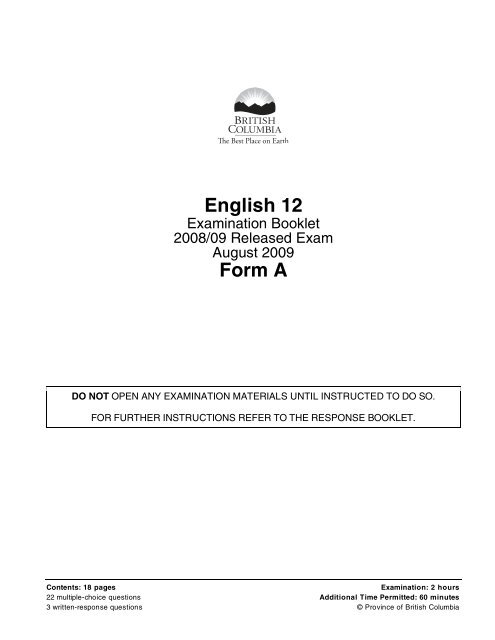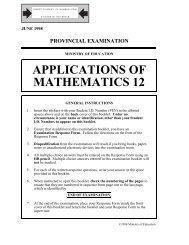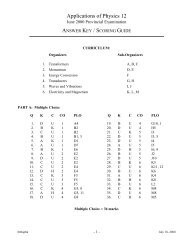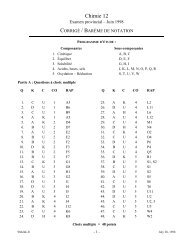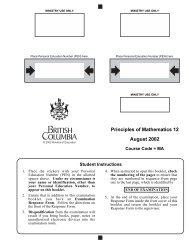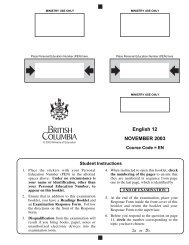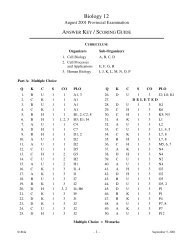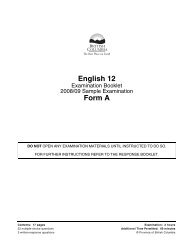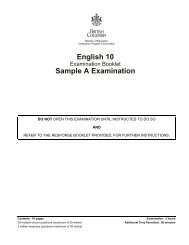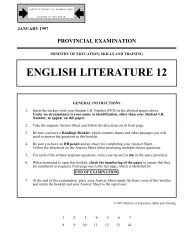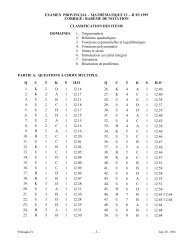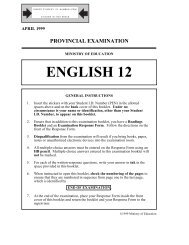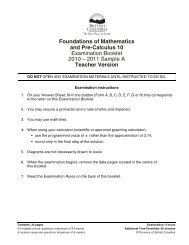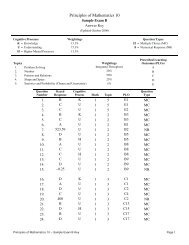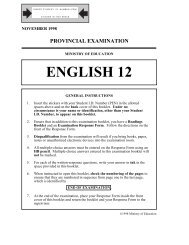english 12 2008-2009 exam.pdf - NBC-CLASS-A-2010-2013
english 12 2008-2009 exam.pdf - NBC-CLASS-A-2010-2013
english 12 2008-2009 exam.pdf - NBC-CLASS-A-2010-2013
You also want an ePaper? Increase the reach of your titles
YUMPU automatically turns print PDFs into web optimized ePapers that Google loves.
English <strong>12</strong><br />
Examination Booklet<br />
<strong>2008</strong>/09 Released Exam<br />
August <strong>2009</strong><br />
Form A<br />
DO NOT OPEN ANY EXAMINATION MATERIALS UNTIL INSTRUCTED TO DO SO.<br />
FOR FURTHER INSTRUCTIONS REFER TO THE RESPONSE BOOKLET.<br />
Contents: 18 pages<br />
Examination: 2 hours<br />
22 multiple-choice questions Additional Time Permitted: 60 minutes<br />
3 written-response questions © Province of British Columbia
You have Examination Booklet Form A. In the box above #1 on your Answer Sheet, fill in the<br />
bubble as follows.<br />
Exam Booklet Form/<br />
Cahier d’<strong>exam</strong>en<br />
A B C D E F G H<br />
English <strong>12</strong> – 0908 Form A Page 1
PART A: READING COMPREHENSION<br />
STAND-ALONE TEXT<br />
7 multiple-choice questions Suggested Time: 25 minutes<br />
1 written-response question<br />
Value: 23%<br />
INSTRUCTIONS: Read the following poem, “The Dumka,” and answer the multiple-choice questions.<br />
For each question, select the best answer and record your choice on the Answer<br />
Sheet provided.<br />
A dumka is a type of song with strongly contrasting parts.<br />
5<br />
10<br />
The Dumka<br />
His parents would sit alone together<br />
on the blue divan 1 in the small living room<br />
listening to Dvorjak’s 2 piano quintet.<br />
They would sit there in their old age,<br />
side by side, quite still, backs rigid, hands<br />
in their laps, and look straight ahead<br />
at the yellow light of the phonograph 3<br />
that seemed as distant as a lamplit<br />
window seen across the plains late at night.<br />
They would sit quietly as something dense<br />
by B.H. Fairchild<br />
15<br />
20<br />
and radiant swirled around them, something<br />
like the dust storms of the thirties 4 that began<br />
by smearing the sky green with doom<br />
but afterwards drenched the air with an amber<br />
glow and then vanished, leaving profiles<br />
of children on pillows and a pale gauze<br />
over mantles and table tops. But it was<br />
the memory of dust that encircled them now<br />
and made them smile faintly and raise<br />
or bow their heads as they spoke about<br />
1 divan: sofa<br />
2 Dvorjak: Czech composer (1841–1904)<br />
3 phonograph: an early device for playing recorded music<br />
4 thirties: The Great Depression of the 1930s was a time of financial hardship and unemployment.<br />
Drought caused crops to fail and dust storms to gather, forcing a mass of people to move to cities<br />
in search of the necessities of life.<br />
Page 2<br />
English <strong>12</strong> – 0908 Form A
25<br />
30<br />
the farm in twilight with piano music<br />
spiraling out across red roads and fields<br />
of maize, bread lines in the city, women<br />
and men lining main street like mannequins,<br />
and then the war, the white frame rent house,<br />
and the homecoming, the homecoming,<br />
the homecoming, and afterwards, green lawns<br />
and a new piano with its mahogany gleam<br />
like pond ice at dawn, and now alone<br />
in the house in the vanishing neighborhood,<br />
35<br />
40<br />
the slow mornings of coffee and newspapers<br />
and evenings of music and scattered bits<br />
of talk like leaves suddenly fallen before<br />
one notices the new season. And they would sit<br />
there alone and soon he would reach across<br />
and lift her hand as if it were the last unbroken<br />
leaf and he would hold her hand in his hand<br />
for a long time and they would look far off<br />
into the music of their lives as they sat alone<br />
together in the room in the house in Kansas.<br />
1. What are the parents primarily contemplating?<br />
A. the landscape of the farm<br />
B. the significant events of their lives<br />
C. the difficulties that others experience<br />
D. the unexpected challenges of the future<br />
2. Which literary device is contained in “the dust storms of the thirties that began / by smearing<br />
the sky green” (lines <strong>12</strong> and 13)?<br />
A. pun<br />
B. metaphor<br />
C. oxymoron<br />
D. apostrophe<br />
English <strong>12</strong> – 0908 Form A Page 3
3. Which characteristic of the people is implied by “lining main street like mannequins” (line 24)?<br />
A. They are spiritless.<br />
B. They are thoughtless.<br />
C. They are well-dressed.<br />
D. They are well-behaved.<br />
4. Which phrase contains assonance?<br />
A. “late at night” (line 9)<br />
B. “smile faintly and raise” (line 19)<br />
C. “coffee and newspapers” (line 31)<br />
D. “room in the house” (line 40)<br />
5. What does the repetition of the phrase “the homecoming” in lines 26 and 27 emphasize?<br />
A. the length of the war<br />
B. the beginning of a new decade<br />
C. the parents’ love of their houses<br />
D. the relief people experienced after the war<br />
6. What change do the parents experience after the end of the war?<br />
A. They have more financial security.<br />
B. They have an increased interest in music.<br />
C. They no longer feel comfortable with traditions.<br />
D. They no longer want to be the same as their neighbours.<br />
7. Which term best describes stanza 2?<br />
A. fantasy<br />
B. dialogue<br />
C. epiphany<br />
D. flashback<br />
Page 4<br />
English <strong>12</strong> – 0908 Form A
INSTRUCTIONS: In paragraph form and in at least 150 words, answer question 1 in the Response<br />
Booklet. Write in ink. Use the Organization and Planning space to plan your<br />
work. The mark for your answer will be based on the appropriateness of the <strong>exam</strong>ples<br />
you use as well as the adequacy of your explanation and the quality of your written<br />
expression.<br />
1. Discuss contrast in the poem “The Dumka.”<br />
Organization and Planning<br />
Use this space to plan your ideas before writing in the Response Booklet.<br />
WRITING ON THIS PAGE WILL NOT BE MARKED<br />
English <strong>12</strong> – 0908 Form A Page 5
PART B: READING COMPREHENSION<br />
13 multiple-choice questions Suggested Time: 25 minutes<br />
Value: 16%<br />
SYNTHESIS TEXT 1<br />
INSTRUCTIONS: Read the following selection, “The Most Powerful Question a Parent Can Ask…,”<br />
and answer the multiple-choice questions. For each question, select the best answer<br />
and record your choice on the Answer Sheet provided.<br />
The Most Powerful Question a Parent Can Ask…<br />
by Neil Millar<br />
1 The question I have for you drives right to<br />
the heart of the matter. It could alter that<br />
tired, haggard feeling you have at the end<br />
of a day or weekend. It could alter the life<br />
of your children for the better and the life<br />
of their future partner. More than that, it<br />
could even alter your community, because<br />
once I’ve told you the question and you’ve<br />
seen how powerful it is you’ll want to share<br />
it with your brother, sister, neighbours and<br />
friends.<br />
2 Before I ask you my question I want to set<br />
the scene. You’re a loving parent striving to<br />
give your children the best life you can offer.<br />
You race around the household picking up<br />
their dirty underwear from under the bed,<br />
collecting the towels from the bathroom floor<br />
and spend whatever time it takes to knock up<br />
their favourite food while one of your<br />
children spends fifty percent of their free time<br />
surfing the net and talking in chat rooms and<br />
the other catches up on thirty hours of TV a<br />
week. Meantime, you…<br />
3 Well, sometimes you might feel tired.<br />
Sometimes deflated. Sometimes<br />
unappreciated and perhaps just a tad grumpy!<br />
If you relate to any of what I describe then<br />
my question will change it all for you and I<br />
recommend you read on.<br />
4 For women, age-old family values still play a<br />
big part. Values passed on—mother-tomother—combine<br />
with the natural instincts to<br />
love, support and nurture. And despite doing<br />
a day job you probably still arrive home and<br />
strive to take care of your family in the way<br />
Page 6<br />
your mother took care of you. But are your<br />
mother’s old values working for you and,<br />
just as importantly, are they working for your<br />
children? So, here is the question…<br />
5 What kind of children do you want to raise?<br />
6 Do we want to raise well-rounded, confident,<br />
considerate children that show gratitude and<br />
appreciation for all that is given to them and<br />
just a fraction of what you do for them? Do<br />
you want strong, loving children, who<br />
understand and accept responsibility for their<br />
‘self’ and the ones they love? If you do then I<br />
have a second question for you…<br />
7 Will the current behaviour in your household<br />
make that happen?<br />
8 Will chatting to strangers on the internet<br />
during a large part of her free time help your<br />
daughter become a confident, considerate<br />
woman? Will Homer Simpson help your son<br />
to respect his ‘self’ and the ones he loves?<br />
And will you picking up their sweaty,<br />
crumpled underwear help them to become<br />
responsible for their own lives?<br />
9 I recently overheard a woman talking about<br />
her <strong>12</strong>-year-old son. She confessed to laying<br />
out his clothes each morning, packing his<br />
school bag with books and food and then she<br />
said, “Because if I don’t, he’ll forget.” This<br />
shocked me and here is why…<br />
10 My own children, since the age of five have<br />
done all the things that a lot of mothers still<br />
do. Why? Because I am their parent—their<br />
guide and leader, not their nanny—and as<br />
English <strong>12</strong> – 0908 Form A
such I have a responsibility to first nurture,<br />
then educate, then, as soon as they are ready,<br />
hand over responsibility for their well-being<br />
to them. Children who take part in their own<br />
life—picking up their dirty linen, contributing<br />
to dinner and tidying their home—go on to<br />
become confident, well-rounded, respectful<br />
kids; and children who don’t…well they’re<br />
the ones you might moan about to your<br />
friends when you witness them disrespecting<br />
both other human beings and the<br />
environment.<br />
11 Begin by directing your children to take on<br />
small tasks. Ask them to put their clothes in a<br />
washing basket or hang a towel up. Ask<br />
them to bring their plates to the sink and<br />
wash them after dinner and tell them they are<br />
helping you and that you really appreciate<br />
their help. Give them a hug for their help and<br />
they might do even more! As they get better,<br />
increase the tasks. Ask them to cut the grass<br />
for you, iron the clothes or cook dinner. And<br />
if you think that is too much responsibility<br />
then think about this…<br />
<strong>12</strong> A Maasai tribe leader appointed a seven yearold<br />
girl as the person in charge of two-thirds<br />
of his village’s wealth. The wealth was not<br />
held in money, but in three camels. The girl<br />
was responsible for ensuring that these<br />
camels stayed safe and well fed and she<br />
knew if she failed to do this properly then the<br />
villagers may end up starving. Maybe we<br />
could trust our children with a vacuum or a<br />
mop or a duster once or twice a week!<br />
Percent of Students With Positive School Experience or High Performance,<br />
by Work Status and Gender<br />
Experiences<br />
No Job %<br />
Males<br />
Short<br />
Hours %<br />
Long<br />
Hours %<br />
No Job %<br />
Females<br />
Short<br />
Hours %<br />
Long<br />
Hours %<br />
A or B Average 69 76 58 78 84 74<br />
Enjoyed School 80 86 78 85 93 80<br />
Found Classes Interesting 70 73 67 79 83 76<br />
Participated in Class as Much<br />
as or More than Others<br />
Participated in Extracurricular<br />
Activities<br />
86 89 85 88 91 87<br />
69 78 71 67 71 62<br />
Figure 1<br />
English <strong>12</strong> – 0908 Form A Page 7
8. Which term best describes the phrase “heart of the matter” (paragraph 1)?<br />
A. cliché<br />
B. dialect<br />
C. allusion<br />
D. hyperbole<br />
9. According to the article, what is the most powerful question a parent can ask?<br />
A. “are your mother’s old values working for you and, just as importantly, are they<br />
working for your children?” (paragraph 4)<br />
B. “What kind of children do you want to raise?” (paragraph 5)<br />
C. “Will Homer Simpson help your son to respect his ‘self’ and the ones he loves?”<br />
(paragraph 8)<br />
D. “will you picking up their…underwear help them to become responsible for their own lives?”<br />
(paragraph 8)<br />
10. What is the purpose of the reference to the Maasai leader (paragraph <strong>12</strong>)?<br />
A. to encourage parents to make their children work harder<br />
B. to show that children are capable of taking on important roles<br />
C. to demonstrate how children may be over-worked in various cultures<br />
D. to suggest that a simple life is preferable to one with modern conveniences<br />
11. Which method of development is predominant in the article?<br />
A. expert testimony<br />
B. anecdotal evidence<br />
C. historical reference<br />
D. pro and con argument<br />
<strong>12</strong>. Which word best describes the writer’s tone?<br />
A. ironic<br />
B. objective<br />
C. persuasive<br />
D. empathetic<br />
Page 8<br />
English <strong>12</strong> – 0908 Form A
13. According to the article, which statement best describes children who are raised without<br />
responsibility?<br />
A. They may become lazy adults.<br />
B. They may grow into adulthood slowly.<br />
C. They may question authority and act without caution.<br />
D. They may show disrespect toward others and their environment.<br />
14. With reference to Figure 1, which statement about students is supported by the information<br />
in the table?<br />
A. Students who hold no job achieve the highest grades.<br />
B. Male and female students are equally affected by working long hours.<br />
C. Students who work short hours have the most positive school experience.<br />
D. Male and female students who hold no job participate more in extracurricular activities<br />
than do others.<br />
English <strong>12</strong> – 0908 Form A Page 9
SYNTHESIS TEXT 2<br />
INSTRUCTIONS: Read the following excerpt from “Be-ers and Doers,” and answer the multiple-choice<br />
questions. For each question, select the best answer and record your choice on the<br />
Answer Sheet provided.<br />
The narrator of this story observes her family from when she was young<br />
until she herself is a mother.<br />
adapted from Be-ers and Doers<br />
by Budge Wilson<br />
1 Mom was a little narrow wisp of a woman. You wouldn’t have thought to look at her that she could<br />
move a card table; even for me it was sometimes hard to believe the ease with which she could shove<br />
around an entire family. Often I tried to explain her to myself. She had been brought up on the South<br />
Shore of Nova Scotia. I wondered sometimes if the scenery down there had rubbed off on her—all<br />
those granite rocks and fogs and screeching gulls, the slow, labouring springs, and the quick, grudging<br />
summers. And then the winters—greyer than doom, and endless.<br />
2 I was the oldest. I was around that house for five years before my sister Maudie came along. They were<br />
peaceful, those five years, and even now it’s easy to remember how everything seemed calm and<br />
simple. But now I know why. I was a conformist and malleable as early as three years old; I didn’t<br />
buck the system. So there were very few battles at first, and no major wars.<br />
3 Dad, now, he was peaceful just by nature. If a tornado had come whirling in the front door and lifted<br />
the roof clear off its hinges, he probably would have just scratched the back of his neck and said, with a<br />
kind of slow surprise, “Well! Oho! Just think o’ that!” He had been born in the Annapolis Valley,<br />
where the hills are round and gentle, and the summers sunlit and very warm.<br />
4 “Look at your father!” Mom would say to us later. “He thinks that all he’s gotta do is be. Well, bein’<br />
ain’t good enough. You gotta do, too. Me, I’m a doer.” All the time she was talking, she’d be knitting<br />
up a storm, or mixing dough, or pushing a mop—hands forever and ever on the move.<br />
5 Although Mom was fond of pointing out to us the things our father didn’t do, he must have been doing<br />
something. Our farm was in the most fertile part of the valley, and it’s true that we had the kind of soil<br />
that seemed to make things grow all of their own accord. Those beets and carrots and potatoes just<br />
came pushing up into the sunshine with an effortless grace, and they kept us well fed, with plenty left<br />
over to sell. But there was weeding and harvesting to do, and all those ten cows to milk—not to<br />
mention the thirty apple trees in our orchard to be cared for. I think maybe he just did his work so<br />
slowly and quietly that she found it hard to believe he was doing anything at all. Besides, on the South<br />
Shore, nothing ever grew without a struggle. And when Dad was through all his chores, or in between<br />
times, he liked to just sit on our old porch swing and watch the spring unfold or the summer blossom.<br />
6 Albert was the baby. I was eight years old when he was born, and I often felt like he was my own<br />
child. He was special to all of us, and when Mom saw him for the first time, I watched a slow soft<br />
Page 10<br />
English <strong>12</strong> – 0908 Form A
tenderness in her face that was a rare thing for any of us to see. Right away, I knew she was going to<br />
pour into Albert something that didn’t reach the rest of us, except in part. As time went on, this scared<br />
me. I could see that she’d made up her mind that Albert was going to be a perfect son. That meant, among<br />
other things, that he was going to be a fast-moving doer. And even when he was three or four, it wasn’t<br />
hard for me to know that this wasn’t going to be easy. Because Albert was a be-er. Born that way.<br />
7 Mom really loved my dad, even though he drove her nearly crazy. Lots more went on than just nagging<br />
and complaining. If you looked really hard, you could see that. If it hadn’t been for Albert and wanting<br />
him to be a four-star son, she mightn’t have bothered to make Dad look so useless. Even so, when they<br />
sat on the swing together at night, you could feel their closeness. They didn’t hold hands or anything.<br />
Her hands were always too busy embroidering, crocheting, mending something, or just swatting<br />
mosquitoes. But they liked to be together. Personal chemistry, I thought as I grew older, is a mysterious<br />
and contrary thing.<br />
8 One day, Albert brought his report card home from school, and Mom looked at it hard and anxious,<br />
eyebrows knotted. “ ‘Albert seems a nice child,’ ” she read aloud to all of us, more loudly than<br />
necessary, “ ‘but his marks could be better. He spends too much time looking out the window,<br />
dreaming.’ ” She paused. No one spoke.<br />
9 “Leanin’ on his hoe,” continued Mom testily. “Albert!” she snapped at him. “You pull up your socks<br />
by Easter or you’re gonna be in deep trouble.”<br />
10 Dad stirred uneasily in his chair. “Aw, Dorothy,” he mumbled, “leave him be. He’s a good kid.”<br />
11 “Or could be. Maybe,” she threw back at him. “What he seems like is rock-bottom lazy. But I love him<br />
a lot,” continued Mom. “If it’s the last thing I do, I’m gonna light a fire under his feet.”<br />
<strong>12</strong> Albert was twelve then, and the nagging began to accelerate in earnest.<br />
13 “How come you got a low mark in your math test?”<br />
14 “I don’t like math. It seems like my head don’t want it.”<br />
15 “But do you work at it?”<br />
16 “Well, no. No. Not much. Can’t see no sense in workin’ hard at something I’ll never use. I can add up<br />
our grocery bill. I pass. That’s enough.”<br />
17 “Not for me, it ain’t,” she’d storm back at him. “No baseball practice for you until you get them sums<br />
perfect.”<br />
18 One thing Albert was good at, though, was English class. By the time he got to high school, he spent<br />
almost as much time reading as he did staring into space. His way of speaking changed. He stopped<br />
dropping his g’s. He said isn’t instead of ain’t. His tenses were all neated up. He wasn’t putting on<br />
airs. I just think that all those people in his books started being more real to him than his own<br />
neighbours. He loved animals, too. He made friends with the calves and even the cows. Mutt and Jeff,<br />
our two grey cats, slept on his bed every night. Often you could see him out in the fields, talking to our<br />
dog, while he was working.<br />
19 “Always messin’ around with animals,” complained Mom. “Sometimes I think he’s three parts woman<br />
and one part child. He’s fifteen years old, and last week I caught him bawlin’ in the hayloft after we<br />
had to shoot that male calf. Couldn’t understand why y’ can’t go on feedin’ an animal that’ll never<br />
produce milk.”<br />
English <strong>12</strong> – 0908 Form A Page 11
20 “Nothing wrong with liking animals,” I argued.<br />
21 “If you can’t see,” she said through the screen door, “why I don’t want Albert to end up exactly like<br />
your father, then you’ve got even less sense than I thought you had. I don’t want any son of mine goin’<br />
through life just satisfied to be.” Then I could hear her banging around in the kitchen.<br />
22 I looked off the verandah out at the front field where Dad and Albert were raking up hay for the cattle,<br />
slowly, with lots of pauses for talk. All of a sudden they stopped, and Albert pointed up to the sky. It<br />
was fall, and four long wedges of geese were flying far above us, casting down their strange muffled<br />
cry. The sky was cornflower blue, and the wind was sending white clouds scudding across it. My<br />
breath was caught with the beauty of it all, and as I looked at Dad and Albert, they threw away their<br />
rakes and lay down flat on their backs, right there in the front pasture, in order to drink in the sky. And<br />
after all the geese had passed over, they stayed like that for maybe twenty minutes more.<br />
* * *<br />
[three years later]<br />
23 We were all home for Christmas the year Albert turned eighteen.<br />
24 It was on December 26th that it happened. That was the day of the fire.<br />
25 Albert had just put my baby back in her carriage when a giant spark flew out of the fireplace.<br />
It hit the old nylon carpet like an incendiary bomb, and the rug burst into flames. Mom started waving<br />
an old afghan 1 over it, as though she was blowing out a match, but all she was doing was fanning the<br />
fire.<br />
26 While most of us stood there in immovable fear, Albert had already grabbed my baby, carriage and all,<br />
and rushed out to the barn with her. He was back in a flash.<br />
27 “Those four buckets in the summer kitchen!” he yelled. “Start filling them!” He pointed to Mom and<br />
Dad, who obeyed him like he was a general and they were the privates. To my husband he roared, “Get<br />
out to th’ barn and keep that baby warm!”<br />
28 “And you!” He pointed to me. “Call the fire department. It’s 825-3131.” In the meantime, the smoke<br />
was starting to fill the room and we were all coughing. Little spits of fire were crawling up the curtains.<br />
29 Before Mom and Dad got back with the water, Albert was out in the back bedroom hauling up the<br />
carpet. Racing in with it over his shoulder, he bellowed, “Get out o’ the way!” and we moved. Then he<br />
slapped the carpet over the flames on the floor, and the fire just died without so much as a protest. Next<br />
he grabbed one of the big cushions off the sofa, and chased around after the little lapping flames on<br />
curtains and chairs and table runners, smothering them.<br />
30 Then Albert was suddenly still, hands hanging at his sides with the fingers spread. He smiled shyly.<br />
31 “It’s out,” he said.<br />
32 Mom took a deep breath. “And that,” she went on, “is what I’ve been looking for, all of your life.<br />
Some sort of a sign that you were one hundred percent alive. And now we all know you are. Maybe<br />
even a lick more alive than the rest of us. So!” She folded her arms, and her eyes bored into him. “I’ll<br />
have no more excuses from you now. I’ll never, never rest until I see you educated and successful.<br />
Doin’ what you was meant to do. I’m just proud of you, Albert. So terrible proud!”<br />
1 afghan: blanket<br />
Page <strong>12</strong><br />
English <strong>12</strong> – 0908 Form A
33 Members of the fire department were starting to arrive at the front door, but Albert ignored them.<br />
34 “You ain’t proud o’ me, Mom,” he whispered, all his beautiful grammar gone. “Yer jest proud o’ what<br />
you want me t’be. And I got some news for you. Things I shoulda tole you years gone by. I ain’t<br />
gonna be what you want.” His voice was starting to quaver now, and he was trembling all over. “I’m<br />
gonna be me.”<br />
35 Then he shut his eyes and fainted right down onto the charred carpet. The firemen carted him off to the<br />
hospital, where he was treated for shock and second-degree burns. He was there for three weeks.<br />
36 Albert left home as soon as he got out of the hospital. He worked as a stevedore 2 in Halifax for a<br />
number of years, and when he got enough money saved, he bought a little run-down house close to<br />
Digby, with a view of the Bay of Fundy. He’s got a small chunk of land that’s so black and rich that<br />
it doesn’t take any pushing at all to make the flowers and vegetables grow. He has a cow and a beagle<br />
and four cats—and about five hundred books. He fixes lawn mowers and boat engines for the people<br />
in his area, and he putters away at his funny little house. He writes pieces for the Digby Courier and<br />
the Novascotian, and last winter he confessed to me that he writes poetry. He’s childless and wifeless,<br />
but he has the time of day for any kid who comes around to hear stories or to have a broken toy fixed.<br />
He keeps an old rocker out on the edge of the cliff, where he can sit and watch the tides of Fundy rise<br />
and fall.<br />
2 stevedore: dockworker<br />
15. What does paragraph 2 suggest about the narrator’s character?<br />
A. She was serene.<br />
B. She was stubborn.<br />
C. She was argumentative.<br />
D. She was accommodating.<br />
16. According to paragraphs 1 and 3, which factor shaped the character of the parents?<br />
A. their hobbies<br />
B. their marriage<br />
C. their family backgrounds<br />
D. their childhood environments<br />
English <strong>12</strong> – 0908 Form A Page 13
17. What is the mother’s goal for young Albert?<br />
A. to encourage creativity<br />
B. to make him courageous<br />
C. to create a desire for success<br />
D. to teach him to be self-sufficient<br />
18. According to the narrator, why does Albert change his way of talking (paragraph 18)?<br />
A. He realizes he needs to grow up.<br />
B. He relates to his experience with literature.<br />
C. He wants to leave behind his life on the farm.<br />
D. He understands the importance of being educated.<br />
19. What does the narrator feel as she watches her father and brother lying down<br />
in the field (paragraph 22)?<br />
A. She resents their laziness.<br />
B. She envies their free time.<br />
C. She admires their spontaneity.<br />
D. She appreciates their laughter.<br />
20. Following the fire, how does the mother react to Albert’s behaviour?<br />
A. She is shocked by his actions.<br />
B. She is appalled by the risks he took.<br />
C. She feels she can accept him as he is.<br />
D. She feels justified in her faith in him.<br />
Page 14<br />
English <strong>12</strong> – 0908 Form A
PART C: READING COMPREHENSION<br />
ANALYSIS OF SYNTHESIS TEXTS 1 AND 2<br />
2 multiple-choice questions Suggested Time: 35 minutes<br />
1 written-response question<br />
Value: 31%<br />
Multiple-choice questions 21 and 22 and written-response question 2 are based on the article “The Most<br />
Powerful Question a Parent Can Ask…” and the literary prose passage “Be-ers and Doers.”<br />
21. With which statement about children would the writer in “The Most Powerful Question a<br />
Parent Can Ask…” and the mother in “Be-ers and Doers” most likely agree?<br />
A. They require firm boundaries.<br />
B. They deserve unconditional love.<br />
C. They ought to establish achievable goals.<br />
D. They should demonstrate greater accountability.<br />
22. Which statement about being a parent applies to both “The Most Powerful Question a Parent<br />
Can Ask…” and “Be-ers and Doers”?<br />
A. It results in pride.<br />
B. It is often rewarding.<br />
C. It can be challenging.<br />
D. It leads to surprising outcomes.<br />
You have Examination Booklet Form A. In the box above #1 on your Answer Sheet, ensure you<br />
filled in the bubble as follows.<br />
Exam Booklet Form/<br />
Cahier d’<strong>exam</strong>en<br />
A B C D E F G H<br />
English <strong>12</strong> – 0908 Form A Page 15
INSTRUCTIONS: In a multi-paragraph (3 or more paragraphs) essay of at least 300 words, answer<br />
question 2 in the Response Booklet. Write in ink. Use the Organization and<br />
Planning space to plan your work. The mark for your answer will be based on the<br />
appropriateness of the <strong>exam</strong>ples you use as well as the adequacy of your explanation<br />
and the quality of your written expression.<br />
2. Assess which passage, “The Most Powerful Question a Parent Can Ask…” or “Be-ers and Doers,”<br />
shows the more respectful approach of parents to their children. You must refer to both passages in<br />
your essay.<br />
Organization and Planning<br />
Use this space to plan your ideas before writing in the Response Booklet.<br />
WRITING ON THIS PAGE WILL NOT BE MARKED<br />
Page 16<br />
English <strong>12</strong> – 0908 Form A
PART D: COMPOSITION<br />
1 written-response question Suggested Time: 35 minutes<br />
Value: 30%<br />
INSTRUCTIONS: Using standard English, write in the Response Booklet, a coherent, unified,<br />
multi-paragraph (3 or more paragraphs) composition of at least 300 words on<br />
the topic below. In your composition, you may apply any appropriate method<br />
of development including exposition, persuasion, description, and narration.<br />
Use the Organization and Planning space to plan your work.<br />
3. Write a multi-paragraph composition on the topic below. In addressing the topic, consider all<br />
possibilities. You may draw support from the experiences of others or from any aspect of your life:<br />
your reading and your experiences. You do not have to accept the basic premise of the topic.<br />
Topic:<br />
With independence comes increased responsibility.<br />
Organization and Planning<br />
Use this space to plan your ideas before writing in the Response Booklet.<br />
WRITING ON THIS PAGE WILL NOT BE MARKED<br />
END OF EXAMINATION<br />
English <strong>12</strong> – 0908 Form A Page 17
ACKNOWLEDGEMENTS<br />
Fairchild, B.H. “The Dumka.” Good Poems. The Penguin Group. 2002.<br />
Figure 1. “Percent of Students With Positive School Experience or High Performance,<br />
by Work Status and Gender” < http://www.hrsdc.gc.ca/en/cs/sp/hrsd/prc/publications/<br />
research/1995-000015/page08.shtml ><br />
Millar, Neil. “The Most Powerful Question a Parent Can Ask…”<br />
http://www.streetdirectory.com/travel_guide/7275/parenting/the_most_powerful_question_<br />
a_parent_can_ask.html<br />
Wilson, Budge. “Be-ers and Doers.” The Leaving. Student Publishing. 1990.<br />
Page 18<br />
English <strong>12</strong> – 0908 Form A
MINISTRY USE ONLY<br />
MINISTRY USE ONLY<br />
Question 1<br />
Marker 1<br />
0<br />
1<br />
2<br />
3<br />
4<br />
5<br />
6<br />
NR<br />
Place Personal Education Number (PEN) here.<br />
Marker 2<br />
0<br />
1<br />
2<br />
3<br />
4<br />
5<br />
6<br />
NR<br />
Question 2<br />
Course Code = EN<br />
<strong>12</strong><br />
AUGUST <strong>2009</strong><br />
Marker 1<br />
0<br />
1<br />
2<br />
3<br />
4<br />
5<br />
6<br />
NR<br />
Exam Booklet Form/<br />
,<br />
Cahier d <strong>exam</strong>en<br />
A B C<br />
D E F G H<br />
Marker 2<br />
0<br />
1<br />
2<br />
3<br />
4<br />
5<br />
6<br />
NR<br />
Student Instructions<br />
Question 3<br />
1. Place your Personal Education Number (PEN)<br />
label at the top of this Booklet AND fill in the<br />
bubble (Form A, B, C, D, E, F, G or H) that<br />
corresponds to the letter on your Examination<br />
Booklet.<br />
Marker 1<br />
0 1<br />
2<br />
3<br />
4<br />
5<br />
6<br />
NR<br />
2. Use a pencil to fill in bubbles when answering<br />
questions on your Answer Sheet.<br />
3. Use a blue- or black-ink pen when answering<br />
written-response questions in this Booklet.<br />
Marker 2<br />
0 1<br />
2<br />
3<br />
4<br />
5<br />
6<br />
NR<br />
4. Read the Examination Rules on the back of<br />
this Booklet.<br />
51848<br />
Version 0810.1
MINISTRY USE ONLY<br />
Place Personal Education Number (PEN) here.<br />
Course Code = EN <strong>12</strong><br />
English <strong>12</strong><br />
<strong>2008</strong>/09 Released Exam<br />
AUGUST <strong>2009</strong><br />
Response Booklet<br />
© Province of British Columbia
WRITTEN-RESPONSE QUESTION<br />
PART A: READING COMPREHENSION<br />
STAND-ALONE TEXT<br />
You may wish to copy the question here to refresh your memory.<br />
Question 1:<br />
English <strong>12</strong> – 0908 Response Booklet Page 1
PART A: READING COMPREHENSION<br />
STAND-ALONE TEXT<br />
1st<br />
2nd<br />
Page 2<br />
English <strong>12</strong> – 0908 Response Booklet
WRITTEN-RESPONSE QUESTION<br />
PART C: READING COMPREHENSION<br />
ANALYSIS OF SYNTHESIS TEXTS 1 AND 2<br />
You may wish to copy the question here to refresh your memory.<br />
Question 2:<br />
English <strong>12</strong> – 0908 Response Booklet Page 3
PART C: ANALYSIS OF SYNTHESIS TEXTS 1 AND 2<br />
Page 4<br />
English <strong>12</strong> – 0908 Response Booklet
PART C: ANALYSIS OF SYNTHESIS TEXTS 1 AND 2<br />
English <strong>12</strong> – 0908 Response Booklet Page 5
PART C: ANALYSIS OF SYNTHESIS TEXTS 1 AND 2<br />
1st<br />
2nd<br />
Page 6<br />
English <strong>12</strong> – 0908 Response Booklet
PART D: COMPOSITION<br />
You may wish to copy the question here to refresh your memory.<br />
Question 3:<br />
English <strong>12</strong> – 0908 Response Booklet Page 7
PART D: COMPOSITION<br />
Page 8<br />
English <strong>12</strong> – 0908 Response Booklet
PART D: COMPOSITION<br />
English <strong>12</strong> – 0908 Response Booklet Page 9
PART D: COMPOSITION<br />
1st<br />
2nd<br />
Page 10<br />
English <strong>12</strong> – 0908 Response Booklet
Examination Rules<br />
1. The time allotted for this <strong>exam</strong>ination is two hours.<br />
You may, however, take up to 60 minutes of additional time to finish.<br />
2. Answers entered in the Examination Booklet will not be marked.<br />
3. Cheating on an <strong>exam</strong>ination will result in a mark of zero. The Ministry of Education<br />
considers cheating to have occurred if students break any of the following rules:<br />
• Students must not be in possession of or have used any secure <strong>exam</strong>ination<br />
materials prior to the <strong>exam</strong>ination session.<br />
• Students must not communicate with other students during the <strong>exam</strong>ination.<br />
• Students must not give or receive assistance of any kind in answering an<br />
<strong>exam</strong>ination question during an <strong>exam</strong>ination, including allowing one’s paper to<br />
be viewed by others or copying answers from another student’s paper.<br />
• Students must not possess any book, paper or item that might assist in writing<br />
an <strong>exam</strong>ination, including a dictionary or piece of electronic equipment, that is<br />
not specifically authorized for the <strong>exam</strong>ination by ministry policy.<br />
• Students must not copy, plagiarize or present as one’s own, work done by any<br />
other person.<br />
• Students must immediately follow the invigilator’s order to stop writing at the end<br />
of the <strong>exam</strong>ination time and must not alter an Examination Booklet, Response<br />
Booklet or Answer Sheet after the invigilator has asked students to hand in<br />
<strong>exam</strong>ination papers.<br />
• Students must not remove any piece of the <strong>exam</strong>ination materials from the<br />
<strong>exam</strong>ination room, including work pages.<br />
4. The use of inappropriate language or content may result in a mark of zero<br />
being awarded.<br />
5. Upon completion of the <strong>exam</strong>ination, return all <strong>exam</strong>ination materials to the<br />
supervising invigilator.


